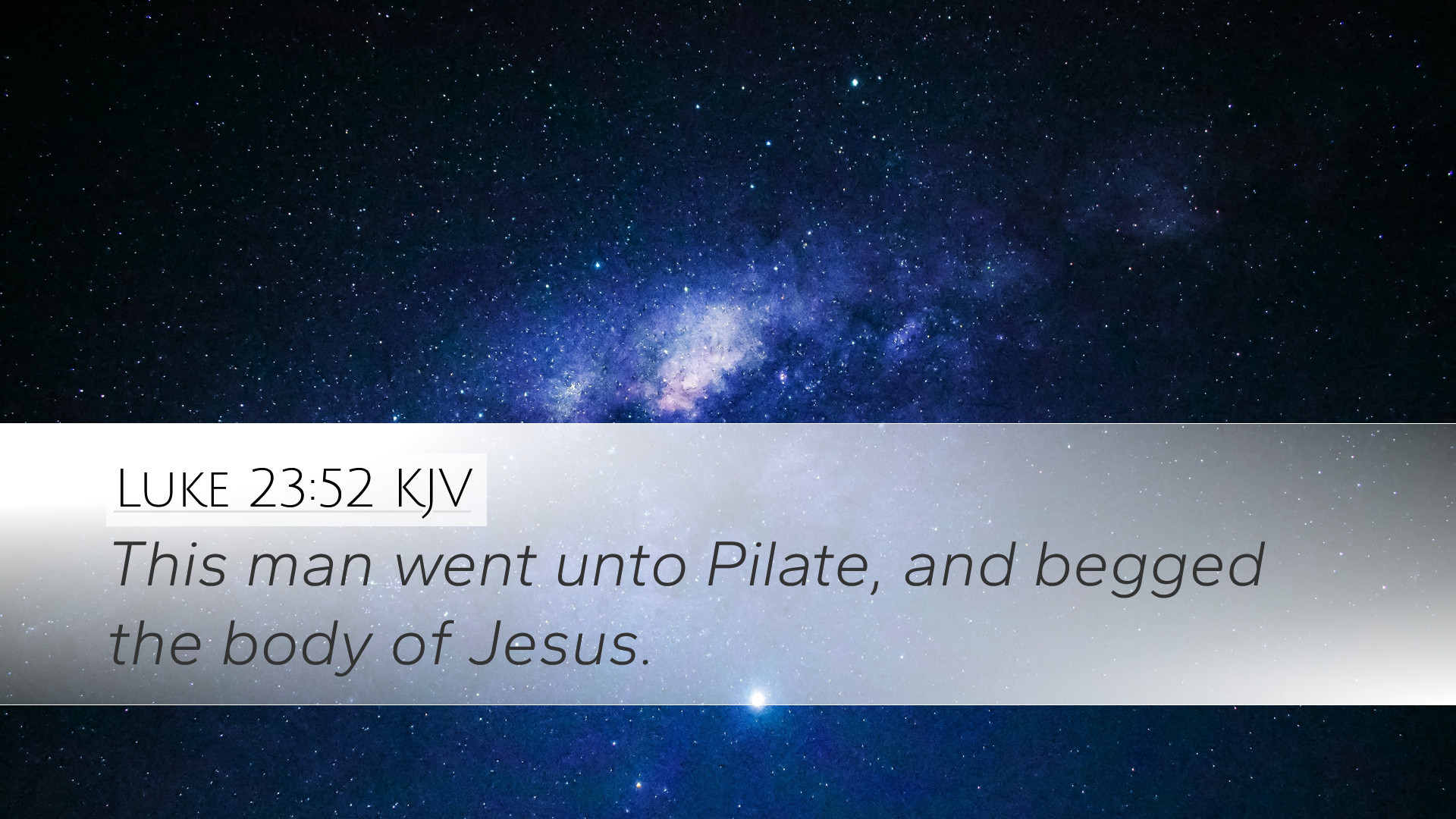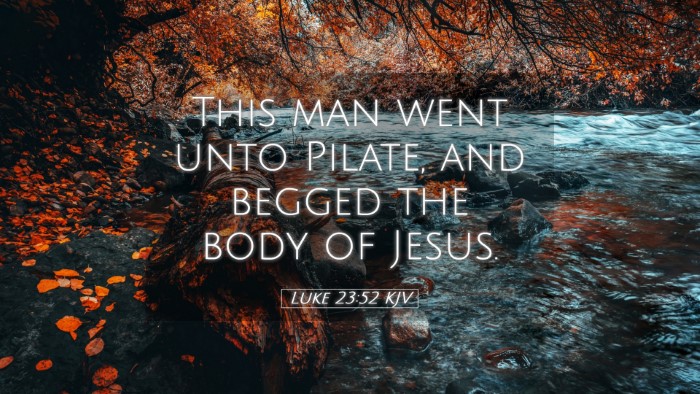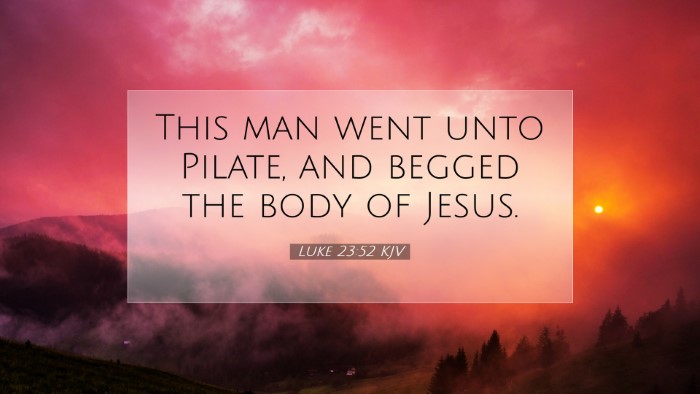Commentary on Luke 23:52
Verse: "This man went unto Pilate, and begged the body of Jesus." - Luke 23:52 (KJV)
Introduction
The account of the burial of Jesus, as recorded in Luke 23:52, highlights a significant moment in the Passion narrative. This verse introduces us to Joseph of Arimathea, a figure whose actions demonstrate both courage and devotion amidst a time of great darkness for Jesus' followers. Combining insights from public domain commentaries, we will explore the implications of this verse for pastors, students, theologians, and Bible scholars.
Contextual Background
Luke 23 depicts the concluding events of Jesus’ earthly ministry, culminating in His crucifixion and subsequent burial. This passage occurs after the crucifixion when Jesus’ body must be cared for. Joseph of Arimathea emerges as a prominent yet often overlooked character whose actions affirm his faith and conviction during a perilous time.
Joseph of Arimathea
- Identity: Joseph is described as a member of the council (Sanhedrin), a good and just man, who had not consented to the council's decision and deed (Luke 23:50-51). His profile suggests not only a position of influence but also moral integrity, as he diverged from the majority opinion of the Sanhedrin concerning Jesus.
- Secret Disciple: John 19:38 further clarifies that Joseph was a secret disciple of Jesus, fearing the Jews. His act of requesting the body of Jesus suggests a shift from the fear of man to faith in Christ, marking a critical turning point in his discipleship.
Theological Insights
Joseph's actions reveal critical theological themes essential for understanding the essence of discipleship and faith.
Faith in Action
Joseph boldly approaches Pilate, requesting the body of Jesus. This act itself can be seen as a profound expression of faith; he risks his reputation and possibly his safety to stand for Jesus. As Matthew Henry states, “It was a great instance of faith and courage to beg the body of Jesus, at a time when his friends were in a state of dismay and despair.” Joseph’s willingness to identify publicly with Jesus serves as a model for believers today, encouraging them to be unashamed of their faith.
Grief and Mourning
This request is set against a backdrop of grief. The disciples, scattered and frightened, were mourning the loss of their leader. Albert Barnes notes that the act of taking care of Jesus’ body was part of a larger mourning process, which reflects humanity's deep need to honor and care for the dead. This aspect resonates with pastors and theologians who emphasize the importance of mourning in the process of healing and community support within the church.
Fulfillment of Scripture
If we examine the overall narrative, Joseph’s actions fulfill prophetic scripture concerning the Messiah's burial. Adam Clarke highlights that Jesus was to be buried with the rich (Isaiah 53:9), and Joseph’s position afforded Him the means to ensure a dignified burial. This fulfillment demonstrates God’s sovereignty and the unfolding of His redemptive plan even in death.
Joseph’s tomb, being new and belonging to him, signifies that Jesus’ death was not an end but rather a pivotal step towards resurrection. This reality embodies the themes of hope and resurrection, which are every bit as crucial for contemporary believers as they were in the early church.
Application for Today
For pastors, students, and scholars, the narrative surrounding Luke 23:52 offers depth for personal and communal reflection.
Encouragement for Boldness
Joseph’s display of physical and emotional boldness serves as a challenge for modern Christians to demonstrate their beliefs in a world that may often be antagonistic towards faith. In moments where faith can lead to social or personal risk, believers are encouraged to remember Joseph's example and to act with conviction.
The Call to Sacrifice
Joseph willingly offers his tomb—a personal sacrifice—for the sake of Jesus. This personal cost invites believers to consider what sacrifices they can make to honor Christ. Pastors can exhort their congregations by reflecting on this theme of sacrificial living, paralleling it with the call to take up one's cross and follow Christ (Luke 9:23).
Emphasis on Community Care
Joseph's request serves as a reminder of the importance of community in supporting one another during difficult times. In moments of grief and loss, it is vital for the church to embody the love of Christ through practical acts of service. This passage encourages the church body to care for one another in tangible ways, reinforcing the call to bear one another's burdens (Galatians 6:2).
Conclusion
In Luke 23:52, we find a pivotal moment encapsulated in the actions of Joseph of Arimathea—a moment rich with theological depth and practical application. His request for the body of Jesus is not simply a historical detail; it is a vivid illustration of faithful obedience, of fulfillment of prophecy and of the hope found in Christ even in the darkest times. As we contemplate this verse, may we derive inspiration to live out our faith boldly, sacrificially, and in loving community—following the example set forth by those who, like Joseph, recognized the significance of standing for Christ.


